Results
-
£127.30
Beginner's Suite - Øystein Sjøvaag Heimdal
This is a four-part suite written for beginning bands at grade level 1. The four movements are different in character and style, and can be performed as a suite or as single movements.Every part is challenging and the melody areplayed by various instruments throughout the piece.Several doublings makes it playable also with a smaller band than the scoring indicate.
Estimated dispatch 7-14 working days
-
 £60.50
£60.50The Gift Of Hope - James Swearingen
Based on the ever-popular folk song "Simple Gifts," this beautiful setting has been created through the use of only six different notes. Swearingen's ability to make a band sound mature beyond their years is a talent that we've all come to appreciate. You can be certain that audiences of all ages will be deeply touched by this highly expressive work. Simply breathtaking!
Estimated dispatch 7-14 working days
-
 £89.99
£89.99Valley Montage and Celebration - Richard L. Saucedo
This work for advanced band was commissioned by the Tennessee Valley Winds to celebrate the group's 30th anniversary. The piece begins quietly with clarinet solo, then quickly moves to a celebratory section in 12/8 meter. The mainmelody is stated in many different voices as it steadily builds to a moment of controlled frenzy. A brief lyrical section features an expressive style and also a moment of glory for the entire woodwind choir. The work concludeswith a return to the vibrant and enthusiastic flavor of the opening. Powerful and impressive writing for mature groups! Dur: 5:10
Estimated dispatch 7-14 working days
-
 £134.99
£134.99Images of Bellac - Jacob de Haan
Images of Bellac is based on a series of images of the beautiful village of Bellac in Limousin, France. The work depicts different scenes and sights of the village using wonderful themes as well as energetic rhythmical sequences symbolising the positive and dynamic attitude of the inhabitants. Well suited for any concert or a contest.
Estimated dispatch 7-14 working days
-
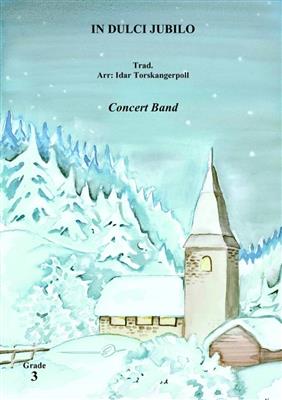 £127.30
£127.30In Dulci Jubilo
This Christmas psalm is famous all over the world and especially in Europe. It is likely that the melody is more than 600 years old.Many famous composers have written their own harmonics and versions of the psalm. This arrangement isbased on two different harmonics; The first and third verse is based on the harmonics by Michael Praetorius while the second verse is based on the harmonics of Johann Sebastian Bach.
Estimated dispatch 7-14 working days
-
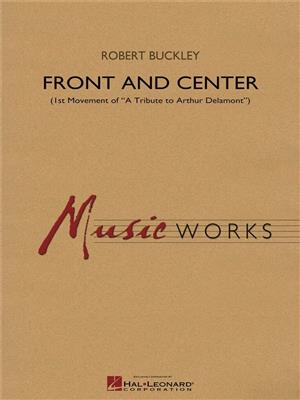 £72.99
£72.99Front and Center - Robert Buckley
Famed bandmaster Arthur Delamont always started his concerts with a rousing overture, and Front and Center is in this proud tradition. In a non-stop 9/8 rhythm, this piece explodes with energy and effervescence. Full of powerfulfanfares, lively melodies, driving percussion and dynamic contrasts, this exciting concert opener moves through different musical colors without ever losing its relentless drive. An exhilarating tour-de-force showcasing allsections of the band! Front and Center is the first movement of A Tribute to Arthur Delamont and was commissioned by the West Vancouver Youth Band. Dur: 3:15
Estimated dispatch 7-14 working days
-
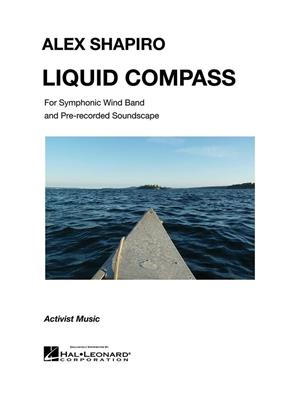 £184.99
£184.99Liquid Compass - Alex Shapiro
Continuing in the tradition of her innovative electroacoustic band works including Paper Cut, Immersion, and Tight Squeeze, Alex Shapiro's Liquid Compass takes the musicians and the audience on a journey that spans the mysticaland the triumphant. A subliminal connection to the sea is conveyed through the creative use of metal bowls filled with water, and flutists will particularly enjoy the otherworldly ooh-wah effect that wends through the piece.Commemoratingthe 140th anniversary of Carthage College's wind band, this workmigrates to different places, but never loses its bearings in pursuit of a musical true north. To perform the piece, you'll need an audio systemcapable of playing the prerecorded audio tracks from a laptop computer via a small digital audio interface connected to an audio mixer. Download information is provided in the printed piece. Dur: 9:00 Recorded by the CentralWashington University Wind Ensemble, Lewis Norfleet - Director.
Estimated dispatch 7-14 working days
-
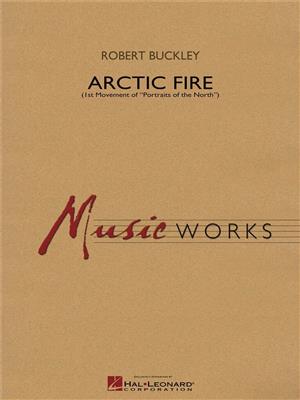 £72.99
£72.99Arctic Fire - Robert Buckley
The cinematic approach to the music of Arctic Fire portrays many different images of the north - the crimson sunlight glinting off the icebergs, the radiance of the Northern Lights, the blaze of the red twig dogwood, the scarletred sunsets, and the fiery spirit of the people who live there. The piece opens and closes with a series of dramatic musical snapshots. Inbetween, the music evolves and transforms through a wide range of stylistic textures andmoods. A brilliantly scored and effective setting for winds. Dur: 5:15
Estimated dispatch 7-14 working days
-
 £57.50
£57.50Propulsion - Robert Buckley
Propulsion is the action of driving or pushing forwards. It is the force that thrusts a rocket into space, that propels a runner across the finish line, and that fuels the momentum of a dolphin through the waves. With drivingpercussion, high-energy rhythms, dynamic melodies and an overall sense of excitement, Propulsion by Robert Buckley moves through different musical moods without ever losing its relentless pulse. A tour-de-force for all members ofthe band and an exhilarating concert opener! Dur: 3:00
Estimated dispatch 7-14 working days
-
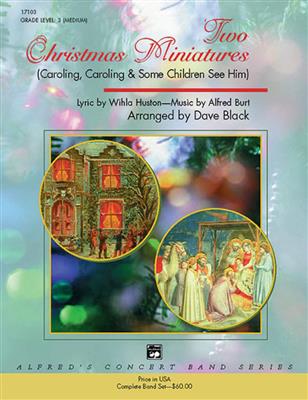 £64.95
£64.95Two Christmas Miniatures
The Christmas carols of Alfred Burt are wonderfully different and fresh. In this arrangement, the first for concert band in thirty years, Dave Black presents a medley of two of the most popular Burt Christmas carols. A rollicking 6/8 rendition of Caroling, Caroling is contrasted by the lush and sensitive chorale Some Children See Him. The rubato second section offers plenty of opportunity for expressive phrasing and gives your entire band a chance to show off their musicality and sound!
Estimated dispatch 7-14 working days
